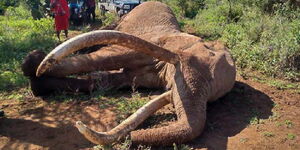Earning the recognition of British royalty, Queen Elizabeth II or her husband Prince Philip, is not an easy fete. A Kenyan legend, whose works of charity in wildlife conservation earned himself global recognition in the '80s, captured the attention of Prince Philip, the Duke of Edinburgh.
According to Rhino Source Centre, Michael Werikhe alias Rhino Man, who passed away in 1999, dedicated his life to fighting for the conservation of Black Rhinos which were facing extinction.
In 1982, Werikhe walked from Mombasa (his hometown) to Nairobi, for 27 days, informing people on the animal's plight, asking them to donate money towards conserving the rhino.
"Conservation cannot be imposed; it must have the understanding and support of the public, and especially in the people on whose land the animals live. We need to come up with practical systems and solutions in line with these realities and the present times - positive aims and positive actions," Werikhe once stated.
In 1985, he walked another approximately 2,011km across Uganda, Kenya and Tanzania, raising over Ksh5 million for rhino conservation studies and sanctuaries. In 1988, he completed a five-month and over 2,896km walk across Europe, starting in Italy and ending in Britain, raising over Ksh100 million for rhino projects.
"It is easy enough to analyse the threats to the future of the black rhino, and it is not very difficult to suggest what needs to be done to prevent it from becoming extinct.
"The real problem is to generate human will and commitment. Your magnificent walk is just the sort of gesture that provides the spark of inspiration which makes people respond to a crisis," Prince Philip, an avid wildlife conservationist lauded.
The money he raised was morphed into Save the Rhino Foundation.
Werikhe was also humble and did not have any kind of formal degree, he operated at the grassroots, hoping to change the attitudes of man towards wildlife. As a young boy, he would sometimes carry small injured animals home to care for them until they could be returned to the wild.
At one point, he accepted a job in the Kenyan Government but left the position soon after. He also worked at a motor assembly firm in Mombasa, in between his charity works.
The Standard in 2014, added that Retired President Daniel arap Moi, former Tanzanian President Ali Hassan Mwinyi, former UN Secretary-General Perez de Cuelleur, the Rev Jesse Jackson and America's 43rd President George W Bush, all wanted to meet him and shake his hand.
His efforts worn him several awards including Guinness Stout Effort Award of 1983. United Nations Environmental Programme (UNEP) also honored him as one of UNEP' s Global SOO in 1989. And, in 1990, he was given the Goldman Environmental Prize. In 1991 he was awarded the BBC ‘African of the Millennium Award’.
Werikhe died in 1999, while he was 43 years, after being attacked by unknown assailants on his way home.
According to the Lewa Wildlife Conservancy, in the 1960s, Kenya was home to an estimated 20,000 black rhinos, but just two decades later, poaching had reduced the population to less than 300.












